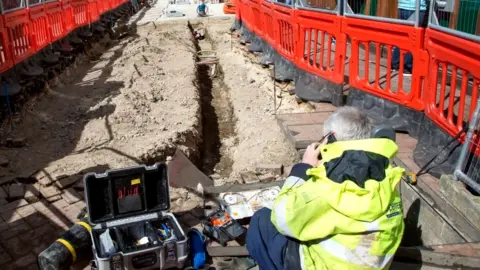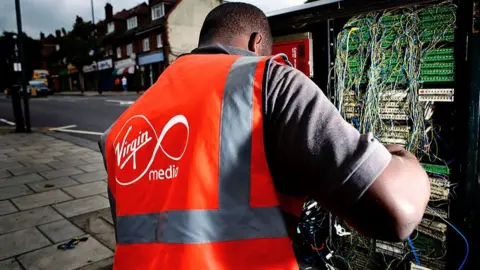Government dodges 'full fibre for all by 2025' pledge
 Getty Images
Getty ImagesThe UK government has opted not to pursue a target of delivering full-fibre broadband to all households by 2025.
Prime Minster Boris Johnson proposed the target while campaigning to become Tory party leader - but the pledge was criticised by industry insiders.
Instead, ministers are now seeking to roll out "gigabit-capable" speeds and have not given a specific end date.
The briefing details were provided following the Queen's Speech.
The speech referenced a planned Telecommunications Infrastructure Bill that aims to "accelerate the delivery of fast, reliable and secure broadband networks to millions of homes".
Since the prime minister lacks a majority of MPs in the House of Commons, the bill is unlikely to be passed into law by this Parliament. But it signals what is likely to become a Conservative Party manifesto commitment for the next general election.
'Just nonsensical'
Mr Johnson had previously called Theresa May's government's promise to deliver full-fibre broadband to everyone by 2033 "laughably unambitious".
"If we want to unite our country and our society, we should commit now to delivering full fibre to every home in the land not in the mid-2030s - but in five years at the outside," he added.
"Of course they will say it can't be done... but it can."
The broadband infrastructure industry's actual reaction was to say the goal was possible but only if the government made radical changes to planning laws among other changes.
Individual companies also questioned whether it really made sense to guarantee an optical cable connection to each home when other alternatives were available that could deliver gigabit-plus speeds at lower costs.
O2's chief executive called the idea of digging up land and laying down cables to even the remotest of homes "just nonsensical" when the last leg of such connections could be provided wirelessly via 5G at lower cost.
 Getty Images
Getty ImagesAnd Virgin Media urged the government to take account of the fact it could deliver 1Gbps speeds by changing how it transmitted data over copper-based coaxial cables already linked to many properties.
Tech-agnostic broadband
The Department for Digital, Culture, Media and Sport (DCMS) has now apparently listened to these concerns and chosen to pursue a tech-agnostic approach.
Rather than stipulating buildings need to be connected to exchanges by their own fibre links, the focus is on promising gigabit speeds, which the DCMS says should allow a high-definition feature film to be downloaded in under 45 seconds.
The legislation also promises to:
- include an earlier pledge to make it easier for broadband providers to install the necessary equipment in blocks of flats when landlords fail to respond to their requests
- require "virtually all" new-build developments to include gigabit-capable connections
Rather than commit to a 2025 deadline, however, the government says it will achieve nationwide coverage "as soon as possible".
The trade association representing the UK's broadband industry said it still wanted politicians to go further.
"The Queen's Speech gave some useful clarity about measures government intends to put in place," Andrew Glover, who chairs the Internet Service Providers' Association, told BBC News.
"However, this legislation alone is not enough to achieve the government's target.
"New builds and wayleaves [right of access] legislation and the existing funding commitments are only the first step to achieving nationwide coverage of gigabit-capable broadband and industry still needs broader support from government to ensure that the whole country is covered."
